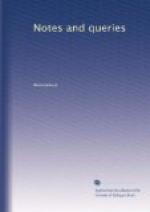“Triste sonans, lente tinnit campana per agros.”
8. By the Rev. J.H. Macauley, in the “Arundines Cami:”—
“Funebris insonuit moriturae naenia lucis.”
Italian:
1. By Cesarotti. 8vo. In Padova, 1772:—
“Parte languido il giorno: odine il segno.”
2. By Crocchi.
Query, when and where originally published? My
copy
is from the same source
as the Latin version by Lloyd:—
“Il Bronzo vespertin con flebil rombo.”
3. By Gennari,
printed on the same pages with the Latin version by
Costa:—
“Nunzio del di che parte intorno suona.”
4. By Giannini. 2nd ed. 4to. London, 1782:—
“Piange la squilla ’l giorno, che si muore.”
5. By Torelli. 8vo. Cambridge, 1782:—
“Segna la squilla il di che gia vien manco.”
The Latin version by Costa, and the Italian by Cesarotti and Torelli, were reprinted by Bodoni in 1793, in 4to., as a supplement to his edition of Gray.
French:
1. By Mons. P. Guedon de Berchere. I have no copy, and do not know the opening line. Perhaps you will oblige me by inserting it in your list of books wanted to purchase. It is entitled “Elegie composee dans un Cimetiere de Campagne.” 8vo. Hookham, &c. 1778.
2. By L.D. 8vo.
Chatham, 1806. Query, what name is represented
by
these initials?—
“le Rappel a marque le jour en son declin.”
3. Prose version. Anonymous. 8vo. A Paris. An vi.:—
“La Cloche du couvre-feu tinte le clas du jour qui expire.”
German:
A translation appeared
in the Kaleidoscope, a weekly paper
published in Liverpool,
in May, 1823. It was communicated by a
correspondent who had
obtained a copy from the writer in Germany:—
“Des Dorfes Glocke schallt den Moor entlang.”
I must frankly avow that I have no present object in seeking information beyond the gratification of curiosity; but I would venture to throw out a hint that an edition of this Elegy, exhibiting all the known translations, arranged in double columns, might be made a noble monument to the memory of Gray. The plan would involve the necessity for a folio size, affording scope for pictorial illustration, on a scale capable of doing justice to “the most finished poem in the English language.”
J.F.M.
* * * * *
ON AUTHORS AND BOOKS, NO. 2
To revive the memory of estimable authors, or of estimable books, is a pursuit to which a man of leisure may devote himself under the certainty that he can neither want materials to proceed with, not miss the reward of commendation.




